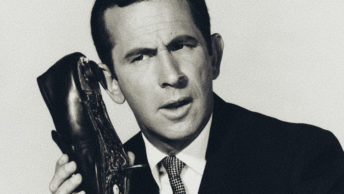If members of my generation were asked the following questions when they were in their 20s, here is how I believe most of them would have answered:
Do you believe in God? Yes
What do you believe about God? That He created me to know, love, and serve Him in this world and be happy with him forever in the next.
What should you do to be happy? Obey His commandments, love my neighbor as myself, and make good use of the gifts He gave me.
How does God expect you to accomplish that? By following my conscience, admitting my failings, forgiving those who have offended me, and seeking forgiveness from those I have offended.
If more recent generations were asked the same questions, here’s how I believe many would answer:
Do you believe in God? Yes (At least I think so)
What do you believe about God? That He wants me to be happy.
What should you do to be happy? Love myself and keep my self-esteem high.
How does he expect you to accomplish that? By following my feelings, holding fast to my opinions, and refusing to be shamed by other people’s criticism.
The difference between those beliefs is large. My generation’s understanding of God focused on our obligations to Him; recent generations tend to focus on self-interest. Mine encouraged humility and contrition for our sins; recent generations focus on thinking well of themselves in all circumstances. Mine felt the need to seek truth in all matters; recent generations believe they already possess it.
I am not blaming younger generations, but instead simply pointing out the important differences in perspective that contribute to the divisions that exist in our society.
No generation is capable of careful analysis and reasoned judgment in early childhood. That capability comes later, and not all at once. During childhood and often much later, we absorb beliefs from our parents, neighbors, peers, teachers, and news sources. Until we develop thinking skills of our own, we are dependent on what we hear and are told. And even after we have the requisite skills, we tend to regard those earlier implanted ideas as our own and defend them accordingly. The idea of examining them for validity can seem unnecessary and self-deprecating.
Advertisers have made good use of implantation since the dawn of their profession. By repeating slogans and jingles over and over, they fix their commercial messages so deeply in our minds that we never fully forget them. Purveyors of political and social narratives have done the same with such phenomenal success that America’s traditional values are now threatened with extinction.
Over the last six decades, our culture has promoted feelings above reason, personal preference over truth, self-esteem over self-control, and self-love over love of God. Classroom lessons have cultivated these values, entertainment media have glamorized them, public figures have modeled them. And when the young people who were indoctrinated with them reached adulthood, they passed them on to their children both by precept and example.
There is a name for the exaltation of self over others and even God. That name is Selfism, and it explains much of the unfortunate behavior we are seeing played out in modern society:
(i) Congressional candidates promising to meet constituents’ pressing needs but, once elected, ignore the promises and devote their efforts to getting re-elected, so they can be in a better position to fulfill the unfulfilled promises. (This deferring of action enables them to play the self-enhancing role of hero without experiencing the difficulty of being one. The performance may continue until retirement.)
(ii) Politicians striving to maintain positive images by blaming their mistakes on others or pretending they never happened. (“Gas prices haven’t increased—they’ve actually decreased.”)
(iii) College faculty and students banning speakers even though they have never heard them speak or read their writings, because they “sense” the speakers do not share their views and therefore must be a threat to their peace of mind.
(iv) People demonizing news channels they have never visited precisely because they have never visited them. (“Those sources must be dishonest because I am very bright and would have approved of them if they were honest.” This is only a tad less moronic than saying, “I’m so brilliant that simply thinking something is so, makes it so.”)
(v) People believing that someone else’s bad action justifies their taking even worse actions. (Example: “Because someone told us a rogue police offer violated someone’s rights, we have a right to form a mob and rob stores, burn buildings, and assault others. Furthermore, doing these things makes us righteous, which confirms their justification.)
(vi) Men sexually assaulting women because “they deliberately aroused us by the way they dressed.” (The self-serving assumption in such cases is that the men’s arousal is the women’s “fault” and they were therefore under no obligation to control it. This enables them to boost their self-esteem by feeling like victims instead of villains.)
(vii) People becoming enraged by “micro aggressions” so subtle as to be perceived by no one else, and responding to these “offenses” by condemning the offender. (The motivating notion here is, “My feelings are so important that whenever I imagine they are hurt, the person responsible must be denied the benefit of the doubt and, if possible, punished.”)
(viii) Gang members and other hoodlums murdering people who wear the wrong color jacket or walk on the wrong street. (Such behavior elevates their control over other life and death and thus elevates their sense of importance.)
(ix) Teachers ignoring the task for which they were hired—teaching students how to gain and apply knowledge about the assigned subject matter—and instead propagandizing them with their personal opinions on irrelevant subjects such as politics and sexual identities, which enhances their feelings of self-worth.)
(x) Social media barons deciding that their status and wealth prove their superiority to others and oblige them to “cancel” those who disagree with their more enlightened view of issues. Not surprisingly, meeting that obligation increases their sense of superiority, which in turn leads them to more cancelling.
Selfism is at the root of all these behaviors. And central to Selfism is the belief that we humans individually create our own reality and truth and therefore have no need for external rules, standards, or codes of behavior, even those history has judged to be essential. (A long history is not proof of an idea’s quality, of course, but the passing of time increases the chance that its weaknesses, if any, will be exposed.)
More than four centuries ago English philosopher Francis Bacon offered this wise advice: “Read not to contradict . . . nor to believe and take for granted . . . but to weigh and consider.” Sensible people have followed that advice ever since, not just because they have respected the man who offered it, but because experience proved it saved them from foolishness and error. That advice is even more valuable today because false notions are more prevalent and Selfism encourages rash judgments.
Few “selfists” are aware of their real beliefs. They may believe in God, but in a way that requires nothing but feeling good about themselves. Even church authorities can be selfists, simply by treating the Bible as a general guide not to be taken literally (or seriously) and by regarding “sin” as determined by “conscience,” which they define not as a guide consistent with God’s commandments, but one governed by their personal inclinations. If questioned by traditionalists, they simply say that their religious belief is “evolving,” a term that sounds profound and is more satisfying than “convenient.”
Selfism may seem harmless, but only because it works quietly, below consciousness, as a feeling or attitude rather than a reasoned view. By telling us that truth is subjective and we already possess it, Selfism takes away our natural human urge to seek and find truth. Believing we already possess truth also blocks us from asking, “Could I be wrong in my view,” a question that both stimulates curiosity and motivates us to inquire about and evaluate other views. Being averse to curiosity and inquiry, in turn, prevents us from gaining new insights that confirm our views or correct our errors. Needless to say, failing either confirmation or correction weakens us intellectually.
As if these negative effects were not enough, Selfism also makes us suspicious of those with different views and defensive about our own views. Suspicious because if we believe we possess truth, we must believe those who disagree with us have embraced falsehood, and that raises questions about their integrity. Defensive because reluctance to learn about views that differ from our own leaves us uncertain whether our views are as valid as we believe.
For any discussion or debate to be fruitful, each participant must be open to the possibility that neither side is totally correct but each side is partly correct. That openness enables each side to give the other a fair hearing. But suspicion and defensiveness make such openness difficult, if not impossible. In fact, they incline us toward intransigence—“The only outcome I am prepared to accept is that I am totally right and the other person is totally wrong.” If either person has such an attitude, conversation is pointless.
The inability to approach discussion and debate with an open mind has put brothers at odds with sisters, children with parents, parents with each other, religious people with non-religious, neighbors with neighbors. The same inability has brought effective functioning of government to a standstill, the economy to a downward slide, and virtually everyone to puzzlement over what has gone wrong. Unless reversed, this trend could bring the most successful democratic republic in history to an end.
The solution to this dangerous problem is to return to our grandparents’ perception of God and self. In other words, to reaffirm that we humans are imperfect; that our selves are works in progress to be improved rather than esteemed; that the search for truth must be accomplished not only individually but cooperatively, by helping one another find insights and overcome errors; that such helping can be accomplished only with mutual respect, open minds, intellectual honesty, and patience with one another’s mistakes and shortcomings; that both forbearance and forgiveness are required for this to happen; and, most importantly, that it will not be sufficient to profess these principles—we must live them!
Copyright © 2022 by Vincent Ryan Ruggiero. All rights reserved








